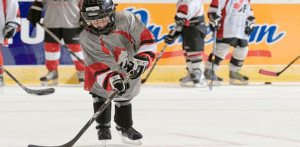When your kids play hockey, it’s okay to have expectations about their experience
 When we sign up our kids for any sport or activity, we inevitably have some expectations that they will get reasonably good coaching and fair treatment. However, nothing can be guaranteed when it comes to coaching and instruction. Especially if we consider that so many community coaches are volunteers.
When we sign up our kids for any sport or activity, we inevitably have some expectations that they will get reasonably good coaching and fair treatment. However, nothing can be guaranteed when it comes to coaching and instruction. Especially if we consider that so many community coaches are volunteers.
Is it reasonable for us as parents to have expectations?
And if yes, then what sorts of expectations are reasonable?
The hockey team without passion
Last season I talked with a hockey mom whose son played on a travel team for kids 11- and 12-years-old. Apparently, the season did not go very well. The team won some games and lost some, but that wasn’t her concern. What she wanted to discuss was the general unease that had settled over the team.
Together with other parents, the mom discussed little things that concerned them. Simple little things like the fact that the kids weren’t playing with “all-out” energy, that they were showing less enthusiasm than in the past season, and that the other teams seemed to be improving faster. “I don’t care that they lose, but I do care that they don’t seem to learn much,” she told me “and that they don’t seem to be having much fun”.
As she mentioned, many of the parents recognized that things were not going great, but none of the parents were prepared to say anything to the coach or their hockey association. Instead, they seemed to have simply written off the season.
The questions arose for this mom:
- Was it fair for the parents to expect more for the kids?
- Was it fair for parents to make greater demands of the coaches?
Parents murmuring on the sidelines
If you have kids in organized competitive sport, you might have lived something similar to this situation. Seasons when there’s some “unease” amongst the parents. Seasons when kids are just going through the motions.
Most parents in this situation are respectful of the coaches, but their comments start to reveal their worries that the kids’ experience is not totally what it could be.
Most often, parents choose to say nothing. If it’s not a critical situation like coaches being bullies, acting inappropriately, or otherwise abusing their power, parents will resign themselves to the idea that it’s not worth creating conflict or controversy. This is when you start to hear comments such as “It will be better next season”, or the proverbial “It’s only a game…”
These comments quiet the conversation for a while, but don’t satisfy anyone. More importantly, nothing gets better for the kids.
It’s okay to want a better experience for your child
In a time when parents acting poorly is frequently featured in the media, one fact remains: the great majority of parents respect their children’s coaches. Given that most coaches are volunteers, parents are acutely aware that they give their time freely and truly want to do what’s best for kids.
This causes a great conflict for parents. By raising the issue that your child is not having a great experience, you are basically implying that you are not happy with the coaching and that’s a very difficult position to be in.
But parents are right to want things to improve for their kids. The challenge is that they don’t have the knowledge or the right words to initiate a constructive conversation amongst themselves, never mind with the coaches.
As a long-time coach to kids and Olympians alike, I can tell you that coaches know when there’s “uneasiness” around the team. It’s an uncomfortable situation to be in, and like parents, coaches often don’t have the tools or words to discuss the situation and make things better.
Three steps you can follow to improve the situation
If things aren’t going totally right, there are three things you can do:
- Focus on what your child wants from playing sports, not on what you want as a parent
- Ensure that your child is having fun and developing skills
- Communicate appropriately with the coaches
By taking these steps, parents can initiate constructive and respectful discussions that will lead to improving the experience not only for the kids, but for everyone involved, including the coaches.
Richard Monette October 26, 2015
